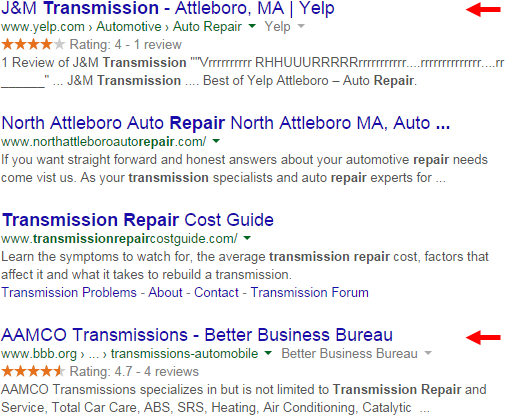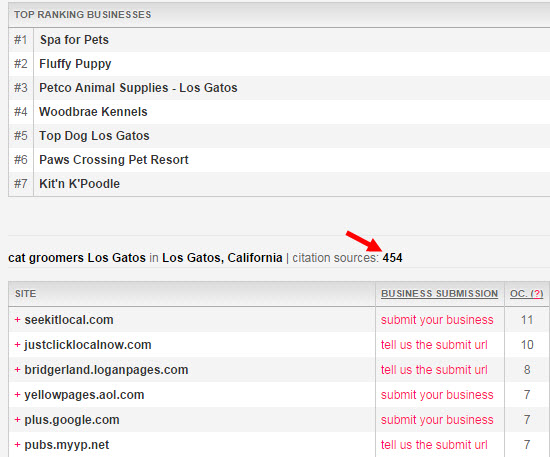People often ask me what kinds of competitive fact-finding I think can help their local SEO efforts. My answer usually is, “Not what you’d think.”
The theory is solid enough: you want to know why your competitors outrank you in the local results, so you try to find out everything you can about them. Knowledge is power, right?
But there are some problems inherent in competitive-intelligence:
- You’ll be tempted to do whatever your competitors do, even if it’s stupid and might earn them a penalty in the future. Lemmings off a cliff.
- You won’t know exactly why they’re ranking well now.
- You may not know how long they’ve ranked well (for all you know, there’s a bug), and you can’t know how long it will last.
- It’s hard to know to what extent your competitors’ search-engine visibility results in paying customers.
- Google can see things that you can’t.

You don’t want to be the schmuck who says, “I don’t get it…I’m doing everything my competitors are doing, so why don’t I have good rankings?” Well, because Google may not be looking for more of the same in the search results – and your would-be customers certainly aren’t.
The best thing you can do is gather the kind of competitive-intel that you can use to get ahead of your competitors, and to ignore the useless facts that only allow you to ape them.
Let’s start with the useless stuff that – in my opinion – isn’t even worth researching:
Useless competitve-intel
- Keyword-density. Because you too can be the proud owner of a spammy site that confuses and annoys visitors.
- Anchor text of inbound links. If you can control the anchor text it’s probably not a good link in the first place. But in either case, the temptation to go too far is too strong.
- Title tags. Most people (especially SEOs) write horrid title tags. Ignore them and just write a good one.
- Domain name. Yes, a keyword-relevant domain is a small advantage. But changing your name is a big deal, and not worth the hassle purely from a rankings standpoint.
- Domain age. Same issues as with domain names, except an old domain that you buy is an even smaller advantage, and you may inherit some backlinks baggage.
- Name of Google Places landing page. In my experience, you’re more likely to rank well if you use your homepage. But there are exceptions. If you see a competitor who’s using a city-specific landing page he / she may be one of the exceptions. Your mileage may vary.
- Google Places description. Your competitors probably don’t rank for every keyword in their descriptions. Most likely neither will you.
Sometimes-useful intel
- Inbound links. (C’mon, you know the pros and cons of looking at competitors’ links.)
- Site structure. Your competitors’ pages may be easier for Google to crawl, and there may be more of them that conceivably could rank well.
- Title tags. Most people (especially SEOs) write horrid title tags. Ignore them and just write a good one – OR, if you must look at someone else’s title tag, do it just to get the creative juices flowing. (Thanks to Dave for reminding me in his comment that this sometimes has value.)
- Citation sources. You also need to know which ones matter.
- General online activity and mentions – the kind of stuff you can monitor with IFTT, Mention.com, or Google Alerts.
My favorite intel
- What useful pages do your competitors have that you don’t?
- Where do they have reviews?
- How many reviewers do they have? It’s worth knowing whether your competitors have had many customers / clients / patients to review them, or they’re banking off one or a few super-fans
- How many of their other locations rank well? You might want to pay closer attention to a company that’s 5 for 6 than one that’s 1 for 6.
- What categories do they use on their Google Places page and on other listings?
![]()
- What kinds of barnacle SEO advantages do they have?

- Are they in blatant violation of any of the Google Places Quality Guidelines?
- What obvious mistakes are they making? (And how can you avoid making those mistakes?)
Pay attention only to the areas where you can do something beyond just ape what other people are doing. Especially in the long term, that’s the only way you can use competitive-intel to pull ahead, rather than to be just another plastic-coated noggin in the peloton.
—
What’s your philosophy on researching local competitors? What do you pay attention to or ignore? Leave a comment!


Helpful article, and a lot of good reading in several of the links you provided within the article – thanks Phil 🙂
Thanks, Andy!
Phil,
Thanks a million for the article. We always do a snapshot of a businesses citations and reviews using Jing.. Because it is a just that a snapshot we really do not spend to much time going into detail. That being said we do focus on citations and reviews highlighting the obvious of what needs immediate attention.
We do this only after we build some type of trust with the business owner with a previous phone call or walk in.
Cheers
That sounds like a good approach, Jason.
I keep a spiral-bound copy of Phil’s “10-Point Guerilla Guide to Using Your Competitor’s To Boost Your Local Visibility to Customers” booklet within reach and refer to it often.
Great stuff!
Thanks, Eddie. I’m flattered that that old clunker still proves at least a little useful 🙂
I tried to find the 10-Point Guerilla Guide to Using Your Competitor’s To Boost Your Local Visibility to Customers, but no luck. Can you post a link to that old clunker Phil? Thanks
Hey Mike,
It was a paid guide I put together about 3 1/2 years ago. It was good when it was up-to-date, but probably wouldn’t be a help now.
I like getting a general idea of what competitors seem to be doing with regards to content marketing or blogging and social media.
I agree, Bill, as long what you discover has some bearing on decision-making. (Otherwise it’s just out of curiosity.)
Hey Phil:
Good list. I’m surprised at one thing though. Why don’t you suggest people review page title tags? There are at least two possibilities, one of which you covered: the title tags might be poorly written or inappropriate. One other possibility might be that the title tags are worthwhile, insightful, and cover an area you missed. In fact I’ve reviewed competitors title tags. I reviewed the title tags, then looked at rankings, with regard to those tags, then reviewed some tools to ascertain traffic. I’ve found title tags that I had missed. We added pages that reflected that wisdom and ended up adding valuable convertible traffic. I wouldn’t rule it out.
Even if you find 25 poorly written title tags you may find a couple that have value. I’d always search for those.
Aside from that one perspective its a great list IMHO. Thanks.
Dave
Good point, Dave. I think looking at competitors’ title tags can be useful insofar as it “inspires” you to write a good one.
You got me to tweak that point 🙂
I find looking at competitors very useful when developing my local Michigan Blogs. Who links to them is often helpful for me. Being local, I have a shot at earning a few of those links myself. I like the idea of seeing how many reviews your competitors have and making sure you have a few more.
Thanks,
Rosh